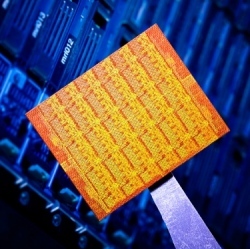
Intel‘s fourth-generation Core microarchitecture, formerly code-named Haswell, has been heralded for a long time, but it’s finally arriving in a variety of low-power computing devices over the next month. Those devices will have 50 percent better battery life than current-generation Ivy Bridge devices when used on active tasks. They will also have double the graphics performance and much lower power consumption in standby mode, Intel executives said in a briefing.
The Haswell chip family (dubbed fourth-generation Core) is the last hurrah for Intel’s outgoing chief executive, Paul Otellini. And it is a convergence architecture that, along with other 22-nanometer chips coming this year, will find its way into PCs, laptops, tablets, and smartphones. The chip family will inspire a new generation of hybrid devices, such as two-in-one concepts like a laptop that can be converted into a tablet. HP showed one such device off this week: the HP Envy Rove 20, a 20-inch all-in-one desktop computer that can be converted into a touchscreen tabletop computer.
For more than a year, Otellini has been pounding the drum on Haswell, which he described as delivering the “largest generation-to-generation improvement in battery life in Intel history.”
